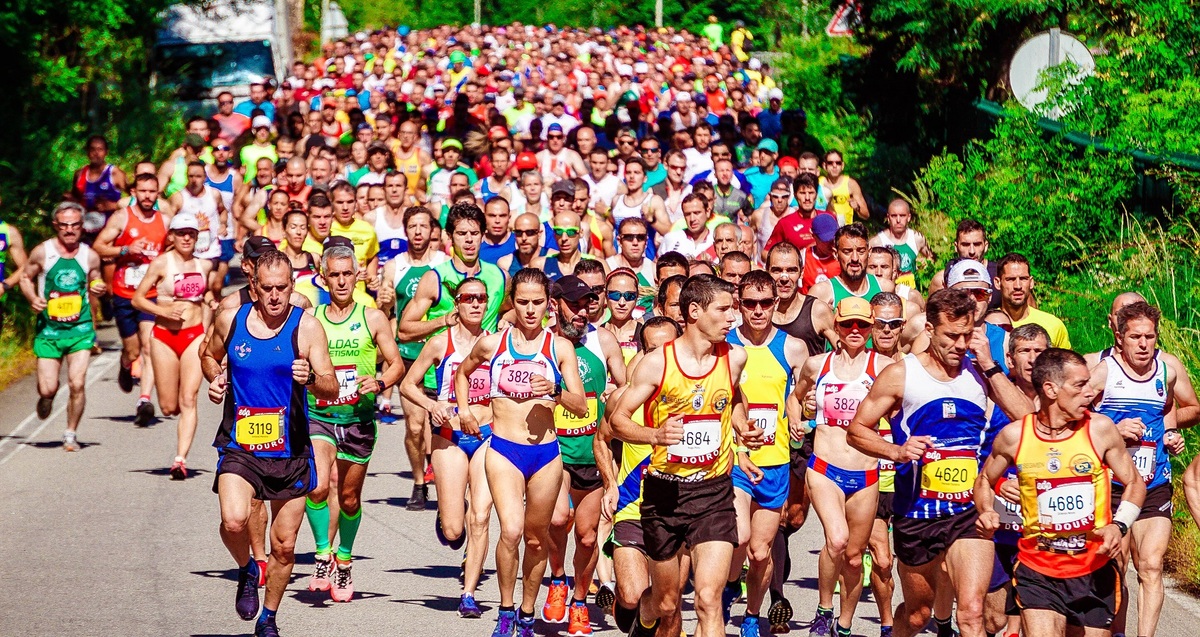

Featured
How To Fuel For A Marathon
Modified: August 19, 2023
Learn the best ways to fuel your body for a marathon and give yourself the energy you need to cross the finish line with our featured guide.
Introduction
Preparing for a marathon requires more than just physical training. To perform at your best during the race, it is crucial to fuel your body properly. Proper nutrition and hydration play a vital role in optimizing performance and ensuring a successful race day.
Whether you are a seasoned marathon runner or a first-time participant, understanding the importance of fueling for a marathon is key. In this article, we will explore the significance of proper nutrition and hydration, provide valuable tips for pre-marathon, during-marathon, and post-marathon fueling, offer advice on hydration strategies, and highlight common fueling mistakes to avoid.
Properly fueling for a marathon is like filling up your car with premium fuel before embarking on a long journey. Without the right fuel, you may experience energy crashes, muscle fatigue, and a decrease in performance. However, with the right fueling strategies, you can optimize your energy levels, improve endurance, and achieve your desired race results.
Whether you are aiming to beat your personal best or simply complete the marathon, fueling your body correctly will give you the energy and stamina you need to cross that finish line with pride. Let’s dive into the details and uncover the secrets to mastering marathon fueling!
Importance of Proper Fueling for a Marathon
When it comes to running a marathon, proper fueling is essential for optimal performance. The food and fluids you consume before, during, and after the race have a profound impact on your energy levels, endurance, and overall race experience.
One of the primary reasons for focusing on proper fueling is to maintain adequate energy levels throughout the race. Marathons are intense endurance events that can last several hours, and your body requires a constant supply of fuel to keep going. Without proper nutrition, you may experience fatigue, muscle cramps, and lack of stamina, hindering your ability to maintain a steady pace.
In addition to providing energy, proper fueling also helps prevent muscle breakdown. During a marathon, your muscles are put under immense stress. Consuming the right balance of carbohydrates, proteins, and fats before and during the race can help preserve muscle mass and minimize muscle damage.
Another critical reason for proper fueling is to optimize recovery. The human body undergoes significant physiological stress during a marathon, and proper nutrition plays a vital role in the recovery process. Consuming the right nutrients post-race helps replenish glycogen stores, repairs muscle tissue, and aids in overall recovery, reducing muscle soreness and discomfort.
Furthermore, proper fueling supports your immune system. Intense exercise like running a marathon can temporarily weaken the immune system, making you more susceptible to illness. Including immune-boosting nutrients in your pre-marathon meals and post-race recovery snacks can help support your immune system and keep you healthy.
Proper fueling also allows for better mental focus and concentration during the race. When your body is properly fueled, your brain receives the necessary nutrients to stay focused, alert, and motivated. This can help you make better decisions, overcome mental fatigue, and push through those challenging moments during the marathon.
In summary, proper fueling plays a crucial role in marathon performance. It provides the energy needed to sustain effort, preserves muscle mass, aids in post-race recovery, supports the immune system, and enhances mental focus. By understanding the importance of fueling and implementing effective nutrition strategies, you can optimize your marathon experience and achieve your goals.
Pre-Marathon Nutrition Tips
The days leading up to the marathon are just as important as race day itself when it comes to fueling your body. Here are some essential pre-marathon nutrition tips to maximize your performance:
- Carbohydrate Loading: Start increasing your carbohydrate intake a few days before the marathon. Carbohydrates are the primary fuel source for endurance activities. Include foods like whole grains, fruits, vegetables, and legumes to ensure your glycogen stores are fully stocked.
- Hydration: Proper hydration is key in the days leading up to the race. Aim to drink plenty of water and electrolyte-rich fluids to ensure your body is adequately hydrated. Avoid excessive caffeine and alcohol, as they may dehydrate you.
- Don’t Try Anything New: Stick to familiar foods and avoid experimenting with new foods or supplements in the days leading up to the race. Opt for foods that you have previously consumed during training runs to minimize the risk of digestive issues on race day.
- Timing of Meals: Pay attention to the timing of your meals. Eat a balanced meal 2-4 hours before the race to provide your body with the necessary fuel and ample time for digestion. Include a combination of carbohydrates, lean proteins, and healthy fats.
- Snacks: Consider consuming a small snack 30-60 minutes before the race to top up your energy levels. Opt for easily digestible foods like a banana, energy bar, or a small serving of yogurt.
- Include Protein: While carbohydrates are the primary focus, don’t overlook the importance of protein. Including lean sources of protein in your pre-race meals helps repair muscle tissue and aids in recovery.
- Limit Fiber: While fiber is an essential nutrient, consuming excessive amounts of fiber before a race can lead to digestive discomfort. Avoid high-fiber foods like beans, bran, and cruciferous vegetables in the hours leading up to the marathon.
- Avoid Heavy or Fatty Meals: Large, heavy meals or foods high in fat can cause digestive issues or make you feel sluggish. Stick to lighter, easily digestible meals to prevent discomfort during the race.
- Supplement when Necessary: If you feel that your nutrient needs may not be met through food alone, consider incorporating supplements like electrolyte tablets or energy gels. However, it is essential to test these supplements during training to ensure they work well for you.
By following these pre-marathon nutrition tips, you can ensure your body is properly fueled and ready for the physical demands of the race. Remember to listen to your body and make adjustments based on your individual needs and preferences.
During-Marathon Fueling Strategies
During a marathon, it is crucial to maintain a steady intake of fuel to keep your energy levels up and sustain your performance. Here are some effective fueling strategies to implement during the race:
- Hydration: Begin hydrating early and continue to drink fluids at regular intervals throughout the race. Aim to consume water or sports drinks to replace the fluids lost through sweat and maintain proper hydration levels. The general recommendation is to drink around 150-250ml (5-9oz) every 15-20 minutes.
- Carbohydrate Gels: Carbohydrate gels are a popular choice among marathon runners as they are convenient and provide a quick source of energy. These gels are typically taken with water and offer a concentrated dose of carbohydrates to fuel your muscles. Start taking gels around the halfway point of the race and continue at regular intervals to keep your energy levels up.
- Sports Drinks: Sports drinks are formulated to provide both hydration and fuel during endurance activities. Look for those that include electrolytes and carbohydrates to replenish both fluids and essential nutrients. Sip on sports drinks at aid stations or carry a small flask with you for easy access.
- Real Food Options: Some marathon runners prefer real food options for fueling during the race. Options like energy bars, bananas, or peanut butter sandwiches can provide a mix of carbohydrates and proteins. Experiment with different options during your training to find what works best for you in terms of taste, digestibility, and ease of carrying.
- Energy Chews or Gummies: Energy chews or gummies are bite-sized, portable snacks that provide a quick source of carbohydrates. They are easy to chew, and many brands offer various flavors to suit your preferences. These can be a convenient option for fueling during the race, especially if you struggle with gels or prefer solid foods.
- Monitor Your Body: Pay close attention to your body’s signals during the race. If you start feeling fatigued, light-headed, or experience muscle cramps, it may be a sign that you need more fuel. Listen to your body and adjust your fueling strategy accordingly.
- Stick to Your Plan: It’s important to have a fueling plan in place before the race and stick to it. Practice your fueling strategy during training runs to find what works best for you. Avoid trying new fuels or drinks on race day to minimize the risk of stomach upset or digestive issues.
- Take Small Sips: When drinking fluids during the race, it’s best to take small, frequent sips rather than large gulps. This helps prevent discomfort and allows for better absorption of fluids.
Remember, fueling during the marathon is not only about meeting your energy needs but also maintaining hydration and electrolyte balance. Experiment with different fueling options during your training runs to find the combination that works best for you.
Post-Marathon Recovery Nutrition
After crossing the finish line, proper nutrition is essential to aid in your body’s recovery and replenish depleted energy stores. Here are some important post-marathon recovery nutrition tips:
- Rehydrate: Begin the recovery process by hydrating your body. Replace the fluids lost during the race by drinking water or electrolyte-rich beverages. Consuming fluids will help restore your body’s hydration levels and aid in the removal of waste products.
- Carbohydrate Refueling: Replenish your glycogen stores by consuming carbohydrates within the first 30 to 60 minutes after the race. Focus on easily digestible carbohydrates such as fruits, whole grains, or energy bars. Aim for a carbohydrate-rich snack or meal with a ratio of 3:1 carbohydrates to protein.
- Protein for Recovery: Include a source of lean protein in your post-race meal to aid in muscle repair and recovery. Opt for protein-rich foods like lean meats, fish, eggs, tofu, or legumes. Protein helps repair damaged muscle tissue and supports the growth and maintenance of muscle mass.
- Include Antioxidants: Intense exercise like running a marathon can cause oxidative stress in the body. Include antioxidant-rich foods such as berries, dark leafy greens, and nuts in your post-race meal to help combat inflammation and support recovery.
- Omega-3 Fatty Acids: Omega-3 fatty acids have anti-inflammatory properties and can aid in the recovery process. Include foods like fatty fish (salmon, trout), chia seeds, flaxseeds, or walnuts to ensure an adequate intake of these beneficial fats.
- Replenish Electrolytes: Electrolytes such as sodium, potassium, and magnesium are lost through sweat during a marathon. Include foods like bananas, oranges, avocados, and electrolyte-rich drinks to help restore electrolyte balance and aid in proper muscle function.
- Listen to Hunger Signals: Pay attention to your body’s hunger signals post-marathon. It is normal to have increased hunger after a race. Eat when you feel hungry and focus on nourishing, well-balanced meals and snacks to meet your caloric needs.
- Rest and Sleep: Allow your body time to recover by getting adequate rest and sleep. This is crucial for muscle repair, hormone regulation, and overall recovery.
Remember, every runner’s recovery needs are unique, so adjust your nutrition plan based on your preferences and body signals. Providing your body with the right nutrients post-marathon will help accelerate recovery, reduce muscle soreness, and optimize your overall physical well-being.
Hydration Tips for Marathon Runners
Proper hydration is crucial for marathon runners to maintain optimal performance and support overall health. Here are some important hydration tips to keep in mind before, during, and after a marathon:
- Start Hydrating Early: Begin hydrating well before race day. In the days leading up to the marathon, make sure to drink plenty of water and electrolyte-rich fluids to ensure your body is well-hydrated.
- Monitor Urine Color: Pay attention to the color of your urine as a hydration indicator. Aim for pale yellow urine, which is a sign of adequate hydration. Dark yellow or amber-colored urine may indicate dehydration, and you should increase your fluid intake.
- Hydrate Before the Race: Drink approximately 500-600ml (17-20oz) of fluid 2-3 hours before the race. This gives your body enough time to absorb the fluids and helps ensure proper hydration at the start line.
- During the Race: Hydrate at regular intervals during the marathon, typically every 15-20 minutes. Drink water or sports drinks available at aid stations, making sure to take small sips rather than gulping down large amounts of fluid. Don’t wait until you feel thirsty to start hydrating.
- Electrolyte Balance: During longer races like a marathon, replenishing electrolytes is essential. Electrolytes like sodium, potassium, and magnesium are lost through sweat and help maintain fluid balance and muscle function. Look for sports drinks or electrolyte tablets that offer a balance of these essential minerals.
- Consider Sweating Rate: Take into account your individual sweating rate to better understand your hydration needs. Weigh yourself before and after a training run to estimate how much fluid you lose through sweat. For every pound lost, aim to drink 500ml (16oz) of fluid to replace lost fluids.
- Use a Hydration Belt or Pack: If aid stations are infrequent or you prefer to carry your own fluids, consider using a hydration belt or pack. These allow you to carry water or sports drinks with you and sip at your convenience.
- Post-Race Hydration: Rehydrate your body after finishing the marathon. Drink fluids to replace the water and electrolytes lost during the race. Aim to consume fluids containing sodium to aid in electrolyte balance.
- Avoid Overhydration: While proper hydration is essential, be cautious not to overhydrate. Overhydration can lead to hyponatremia, a condition where sodium levels in the blood become diluted. Be mindful of your fluid intake and listen to your body’s signals.
Remember, hydration is an ongoing process, and staying properly hydrated before, during, and after a marathon is crucial for maintaining performance, preventing dehydration, and supporting overall well-being. Develop a hydration plan that works for you based on your training, weather conditions, and individual needs.
Common Fueling Mistakes to Avoid
Proper fueling is essential for marathon success, but there are common mistakes that runners often make. Being aware of these fueling errors can help you avoid them and optimize your performance. Here are some common fueling mistakes to avoid:
- Not Practicing Fueling during Training: One of the biggest mistakes is failing to practice your fueling strategy during training runs. Experiment with different fueling options and timing to find what works best for your body. Training is the time to figure out what foods and drinks are well-tolerated and provide the energy you need.
- Skipping Pre-Race Nutrition: Neglecting pre-race nutrition can leave you with inadequate energy reserves before the marathon even begins. Failing to properly fuel up beforehand can result in early fatigue and diminished performance. Stick to your pre-race nutrition plan and ensure you consume a balanced meal a couple of hours before the race.
- Overlooking Post-Race Recovery Nutrition: After the marathon, many runners focus solely on rest and fail to prioritize post-race nutrition. Consuming carbohydrates and protein within the first hour after the race aids in muscle recovery and replenishes depleted glycogen stores. Don’t neglect this essential aspect of the recovery process.
- Ignoring Hydration during the Race: Hydration is vital during a marathon, but some runners may neglect regular fluid intake or rely solely on thirst as a hydration cue. It’s crucial to have a plan in place and hydrate at regular intervals during the race to replenish fluids lost through sweat and maintain optimal performance.
- Not Fueling Consistently during the Race: Some runners may forget to consistently fuel during the marathon, especially when the fatigue sets in. Consistent fueling helps maintain energy levels and prevents the dreaded “bonk” or hitting the wall. Stick to your fueling plan and set reminders if needed to ensure you stay on track.
- Experimenting with New Foods or Supplements: Race day is not the time to try new foods, drinks, or supplements. Stick to the foods and fuels that have worked well for you during training. Introducing new items on race day can lead to digestive issues, discomfort, or energy crashes.
- Depending Solely on Sports Drinks or Gels: While sports drinks and gels are convenient sources of fuel during a marathon, relying solely on them can lead to flavor fatigue and potential digestive issues. Don’t forget to include real food options like energy bars, fruits, or sandwiches to provide variety and a mix of nutrients.
- Ignoring Individual Nutritional Needs: Every runner is unique, and individual nutritional needs may vary. Tailor your fueling strategy to your body’s specific requirements based on factors like gender, body weight, sweat rate, and personal preferences. Experiment and make adjustments to find what works best for you.
- Failing to Plan for Aid Stations: Neglecting to plan for aid stations can lead to inadequate hydration or fueling during the race. Study the race route beforehand, familiarize yourself with the location of aid stations, and plan accordingly by carrying fluids or gels if needed.
Avoiding these common fueling mistakes can help ensure that your body remains properly fueled throughout the marathon, allowing you to perform at your best and achieve your desired race goals.
Conclusion
Fueling properly for a marathon is essential for maximizing performance, maintaining energy levels, and promoting overall well-being. By following pre-marathon nutrition tips, such as carbohydrate loading and proper hydration, you can ensure your body is ready for the race. During the marathon, implementing fueling strategies like consuming carbohydrates gels or real food options and staying hydrated are key to sustaining energy levels throughout the race. After crossing the finish line, post-marathon recovery nutrition helps replenish energy stores, repair muscles, and aid in overall recovery.
Hydration is a critical aspect of marathon fueling, and runners should focus on proper fluid intake before, during, and after the race. Avoid common fueling mistakes, such as neglecting pre-race nutrition, failing to consistently fuel during the race, or trying new foods or supplements on race day. Instead, develop a fueling plan based on your individual needs, practice it during training, and rely on familiar and well-tolerated fuels.
By understanding the importance of fueling and implementing effective nutrition and hydration strategies, you can optimize your marathon experience and achieve your goals. Proper fueling will not only enhance your performance during the race but also support your overall health and recovery. Remember, every runner is unique, so listen to your body, experiment with different fueling techniques, and find the approach that works best for you. With the right fueling strategies in place, you’ll be well-prepared to tackle the challenges of a marathon and cross that finish line with pride.









